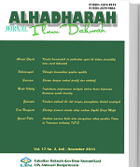Internalisasi Nilai-Nilai Keagamaan Lewat Media
DOI:
https://doi.org/10.18592/alhadharah.v13i25.1712Keywords:
internalization, Islamic values, mediaAbstract
The values of Islam in society are very important. Moreover, the highly complex challenges of our time. Internalization of Islamic values does not just rely on family or school environment. However, it should also involve the media. Because the media have been criticised as a factor in the destruction of the morality and ethics of society rather than enlightening the nation. The negative effects of accessing media are more dominant than the positive ones. Media managers should have the awareness to build and preserve the moral values of the nation. For that, the media is expected to have a formula in shaping and planting of Islamic values to the minds of the audience. The media should be able to transform itself into a form of locomotive movement in internalization of Islamic teachings, because the majority of media audiences are Muslims. Through Islamic media, it is expected to create social structures that have Islamic mindset and behavior in daily lifeReferences
Ahmad Tafsir. 1992. Metodik Khusus Pendidikan Agama Islam. Bandung: PT. Remaja Rosdakarya. Asep Kusnawan. 2014. Konstruksi Pesan Dakwah Integralis, dalam Kajian Dakwah Multiperspektif, Teori, Metodologi, Problem dan Aplikasi, Tim Editor. Bandung: PT. Remaja Rosdakarya. Bagja Waluyo. 2007. Sosiologi: Menyelami Fenomena Sosial di
Masyarakat. Bandung: PT. Setia Purna Inves. Dicky Sofyan. 2013. Agama dan Televisi di Indonesia: Etika dan Problematika Dakwahtaiment. Enjang AS. 2009. Dasar-Dasar Ilmu Dakwah. Bandung: Widya Padjadjaran. Hamzah Ya’qub. 1996. Etika Islam: Pembinaan Akhlaqul karimah. Bandung:Diponegoro. Helmy Masdar. 2008. Islam Profetik, Substansi Nilai-Nilai Agama dalam Ruang Publik. Yogyakarta: ImpulseKanisius. Hoover . 2002. Practicing Religion in the Age of Media. Kirschenbaum, Howard. 1995. 100 ways to enhance values and morality in schools and youth settings. Massachusetts: Allyn & Bacon. Light, D., Keller, S., & Calhoun, C. 1989. Sociology. New York: Alfred A. Knopf. Macionis, J. J. 1970. Society the Basics. New Jersey: Prentice Hall, Englewood Cliffs. Muhammad Nasib ar-Rifa’i, Taisiru alAliyyul Qadir Li Ikhtishari Tafsir Ibnu Katsir, Terj., Drs. Syihabudin, M.A. 1989. Kemudahan Dari Allah Ringkasan Tafsir Ibnu Katsir,Jilid 3, (Jakarta: Geema Insani Press. Noeng Muhadjir. 1992. Pengukuran Kepribadian: Telaah Konsep dan Teknik Penyusunan Test Psikometri dan Skala Sikap. Yogyakarta: Rake Sarasin. Rochmat Wahab. 2013. Pendidikan Karakter di Media Massa. Yogyakarta. Saeful, Asep Muhtadi. 2003. Metode Penelitian Dakwah.Bandung:CV.Pustaka Setia. Sarbini, Ahmad. 2014 .Internalisasi Nilai Keislaman melalui Majelis Taklim, dalam Kajian Dakwah Multiperspektif, Teori, Metodologi, Problem dan Aplikasi, Tim Editor. Bandung: PT. Remaja Rosdakarya. Slamento.1988. Evaluasi Pendidikan. Jakarta: PT. Bina Aksara. Syamsul Munir Amin. 2009. Ilmu Dakwah. Jakarta: Amzah. Syukriadi Sambas. 2005. Filsafat Dakwah. Bandung: KP Hadid. Toto Suryana, Af, A.,dkk. 1996. Pendidikan Agama Islam: untuk Perguruan Tinggi. Bandung: Tiga Mutiara. Wahab, Aziz. 2007. Pendidikan Pancasila dan Kewarganegaraan (PPKn). Jakarta: Penerbit Universitas Terbuka. Zuchdi, Darmiyati. 2008. Humanisasi Pendidikan: Menemukan Kembali Pendidikan yang Manusiawi. Jakarta: Bumi Aksara
Downloads
Published
How to Cite
Issue
Section
License
Authors retain copyright and grant the journal the right of first publication, with the work simultaneously licensed under the Creative Commons Attribution-NonCommercial 4.0 International Public License (CC BY-NC 4.0). This license allows reusers to distribute, remix, adapt, and build upon the material in any medium or format for noncommercial purposes only, provided that proper attribution is given to the original creator.







